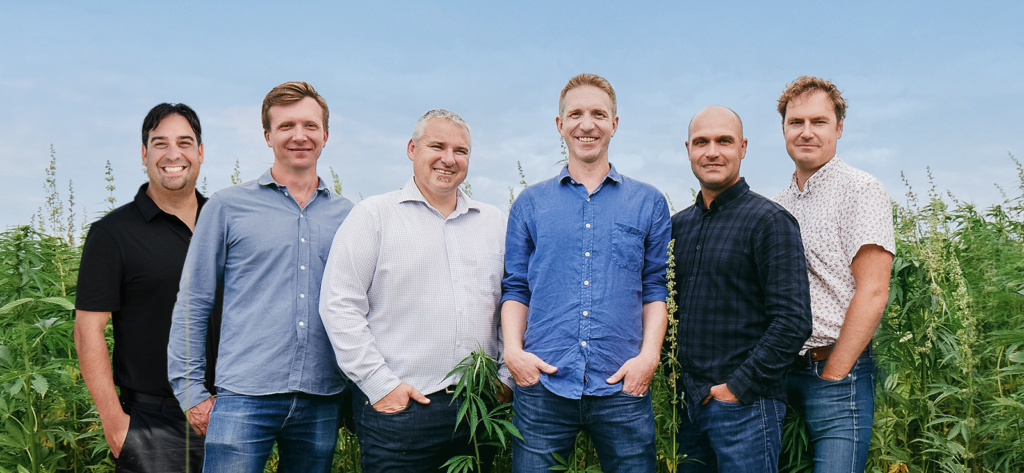Blue sky thinking has no limits. It’s about coming up with new and different ideas or solutions. The Blue Sky Hemp Ventures founding partners imagined they could maximize a marginal crop and create opportunities for themselves, their growers, and the planet.
“We founded the company in late 2017 with the intention of building a business on the whole hemp plant—flower for cannabinoids and extraction, seed for food ingredients, and stock for fibre and industrial products,” explains Devin Dubois, VP Legal and Regulatory for the company.
Five years later, Blue Sky has two Saskatchewan processing facilities: one in Saskatoon where they produce ingredients that are sold all over the world and one near Rosetown, where they have worked on whole plant utilization, including early work on stalk and flower recovery.
“Our Saskatoon facility has two sides: on the food side of the building, the primary product is what people refer to as hemp hearts; it’s really de-hulled hemp seeds. That’s the highest volume product we make in the plant.”
They also generate hemp seed oil. “Traditional hemp seed oil sold in health food markets is very green, very hempy,” says Dubois. “We’ve managed to make a refined version that has largely been selling into the cosmetics market in Asia.” As a by-product of the oil pressing, they produce a meal that is dried and milled into flours of various kinds and sold in the ingredient market throughout North America.
On the other side of the building, Blue Sky has a licensed cannabis processing facility where they use an ethanol extraction system to make various cannabinoids – CBD and THC extracts.
“The bulk of our customers are other Canadian processors who buy their cannabinoid inputs from us to make retail and medicinal products – vapes, gummies,
chocolates, tinctures, you name it,” says Dubois.
“One of the things we’re hoping for is deregulation of CBD,” he says. “If CBD is moved from the cannabis-regulated market into more of a natural health product, that will create a larger demand for the flower.”
Expanding their food and cannabinoid markets will help Blue Sky increase production and generate a higher volume of fibre. They’ve been experimenting with fibre separation in their Rosetown facility, but Dubois says they have yet to establish a meaningful scale of fibre processing.
Hemp has been cultivated for thousands of years and was once an important crop used to make things like rope, cloth, paper, and insulation. However, hemp production was prohibited in Canada in 1938 because of its association with marijuana. As a result, industrial uses for hemp were displaced over time. “Hemp fibre is one of those industries that really fell out of favour and has been difficult to re-establish,” says Dubois.
It has been legal to grow industrial hemp in Canada since 1998, but increasing hemp production today will come down to economics. Hemp generates similar returns for growers as other oilseed crops like canola and flax, but demand isn’t there to support fibre production.
“Growers can earn about $600 per acre for oilseeds, but based on current genetics and farming practices in Western Canada, the fibre industry can only pay $200 or less per acre,” explains Dubois. “If we can get the fibre stream moving, in addition to the seed, then hemp not only becomes competitive, it should do better economically than a lot of competing crops.”
Hemp seed and plant proteins are leading the way for what Dubois and his partners see as the real potential. “In all honesty, that’s where the real opportunities lie. This can be the first agricultural crop in the region that is truly a multi-revenue stream.”
This potential becomes even more attractive when you factor in the benefits for the environment. “This plant can sequester huge volumes of carbon in things like concrete building products, textiles, you name it. By using the seed, potentially taking off the flower on some acres, and sequestering the stalk, you end up in not only a carbon-neutral situation, but a carbon-negative situation.”
“Our business is founded on this crop, and over the past five years we’ve only strengthened our belief that it has the most economic potential on the Canadian plains. There’s opportunity for a complete industry around the primary processing of this plant coming off the field, and then, potentially, the secondary processing into some finished products.”
Ag-West Bio was one of the first places Blue Sky went for support, direction, and connections within the local food-ingredient processing sector. Dubois says Prairie Food Link, an industry-led cluster supported by Ag-West Bio to encourage development of the value added agri-food sector, has been invaluable.
“We’ve generated some very good relationships out of our association with other processors, which has led to business opportunities we wouldn’t have had otherwise,” he says. “In some ways, maybe we’re competing with other processors, but I think there’s more to be gained if we look for ways to collaborate. I think those who behave that way will do better than those who try to do everything in a silo.”
Photo: Blue Sky’s management team (L-R) Ben Carnevale (VP Sales & Marketing); Michael Rimell (co-founder, CFO); Luke Deering (VP Business Development CBD); Andrew Potter (co-founder, CEO); Wilson Johnson (co-founder, Chief Agronomist); Devin Dubois (co-founder, VP Legal & Regulatory) Credit: Allison Mair
This article is from Ag-West Bio’s 2022-23 Annual Report.
Contact us if you would like a printed copy
